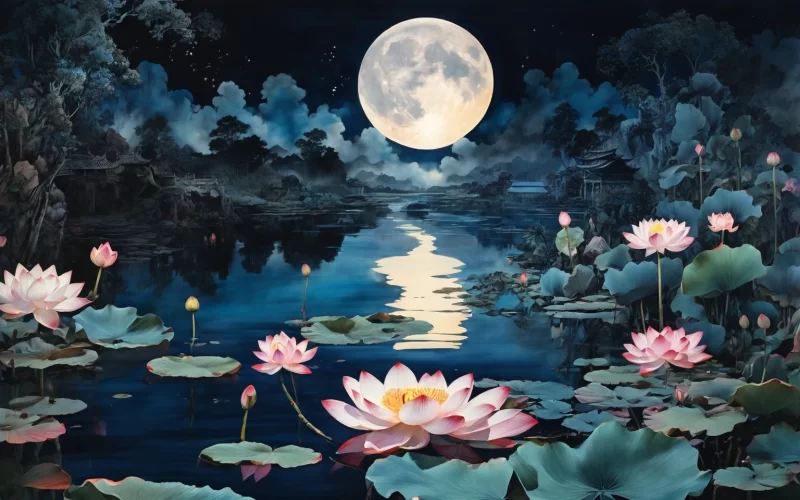The water spreads out like a bolt of silk white;
The boundless lake seems to rise to Heaven’s height.
We may float on the water ‘neath the moon bright
And gaze on flowers aboard a boat with wine.
Original Poem
「秋浦歌 · 其十二」
李白
水如一匹练,此地即平天。
耐可乘明月,看花上酒船。
Interpretation
This sixth poem in Li Bai's seventeen "Song of Qiupu" stands out for its transcendent clarity amidst the series' prevailing melancholy. While the collection largely expresses aging and unfulfilled ambitions, this piece emerges like a fresh breeze, capturing a moonlit boat ride on Pingtian Lake that reveals the poet's spiritual solace and momentary unity with nature following political disillusionment.
First Couplet: "水如一匹练,此地即平天。"
Shuǐ rú yī pǐ liàn, cǐdì jí píngtiān.
Water stretches like a bolt of silk—this is Pingtian, where water meets sky.
The opening sketches a panoramic view through concise metaphor. "Bolt of silk" captures the moonlit lake's smooth surface and luminous softness while suggesting infinite expanse. "This is Pingtian" carries triumphant recognition, as if the poet has reached his idealized waters merging with heavens, foreshadowing subsequent romantic fancy.
Second Couplet: "耐可乘明月,看花上酒船。"
Nài kě chéng míngyuè, kàn huā shàng jiǔ chuán.
How I wish to ride the bright moon, admiring blossoms from a wine-filled boat!
Here stillness gives way to wondrous imagination. "How I wish" conveys intense yearning with a touch of practical limitation. Yet Li Bai's spirit transcends constraints—"ride the bright moon" is inspired, transforming intangible moonlight into a magical vehicle. "Admiring blossoms from a wine-filled boat" concentrates pleasure's essence into a synesthetic paradise blending sight, scent, and taste, epitomizing his romantic style.
Holistic Appreciation
The poem's charm resides in its ethereal purity. In merely twenty characters, it constructs a seamless progression from tangible reality to imaginative flight. The opening line achieves photographic verisimilitude in depicting the moonlit lake, while the second soars into lyrical fantasy. Upon this "sky-merging" expanse, the boundaries between actual and imagined dissolve as the poet's physical and spiritual being unite with moonlight and water. Unlike the heavier melancholy pervading the series, this piece captures Li Bai's momentary liberation from worldly cares—a spiritual exhalation revealing his inherently transcendent nature.
Artistic Merits
- Precise and Aesthetic Metaphor: "Bolt of silk" is simple yet elegant, capturing both the moonlit lake's form and spirit, its whiteness and smoothness providing a pure backdrop for fantasy.
- Fantastical Imagination and Synesthesia: "Ride the bright moon" blends visual and tactile senses, materializing the immaterial—a hallmark of Li Bai's hyperbolic creativity.
- Selective Imagery Combination: "Water," "moon," "blossoms," "wine," and "boat"—each inherently poetic—are skillfully woven into a dust-free, intoxicating poetic realm.
- Ultimate Verbal Economy: Not a wasted word; clear intent and brisk rhythm unleash maximal poetic energy in minimal space, embodying High Tang quatrains' "line-ending but meaning-unending" aesthetic.
Insights
This poem demonstrates how to expand infinite spiritual space within real-world limitations. When physical movement is constrained (residing in Qiupu), the mind can still "ride the bright moon"—Li Bai's most precious lesson. It reminds us that true freedom largely depends on maintaining such poetic, transcendent imagination. In stressful modern life, while we may not often boat on lakes, we can learn from Li Bai: on some evening, gaze at moonlight or still water to let our souls briefly soar, thus creating our own "sky-leveling" spiritual realm. This ability to find wonder in the ordinary and transcendence within constraints is the perfect antidote to life's trivialities.
About the poet

Li Bai (李白), 701 - 762 A.D., whose ancestral home was in Gansu, was preceded by Li Guang, a general of the Han Dynasty. Tang poetry is one of the brightest constellations in the history of Chinese literature, and one of the brightest stars is Li Bai.












